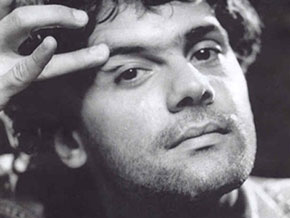This date, July 7, 2011, marks 21 years since Cazuza's death. Therefore, it is inevitable to address it in the column "Beeshas do Brasil", published bi-weekly on Thursdays on the website The Cape.
Practically everything has been said and written about Cazuza, but it remains important to keep his memory alive at every opportunity. And although he has always been defined as bisexual, he had, first and foremost, a gay attitude and stance, in the broadest sense of the word – hence his inclusion in our archive of "Beeshas of Brazil".
Born in Rio de Janeiro on April 4, 1958, Cazuza was a rebel since he was a child. The only son of Lucinha Araújo and João Araújo – executive of the Som Livre record company –, the boy grew up trying to transgress rules and limitations and became a lost adult, without a defined professional path.
Until in 1981, while taking the theater course at Circo Voador, in Arpoador, Cazuza was nominated by Léo Jayme to be the lead singer of a beginning rock band: Barão Vermelho. The empathy between Cazuza and the four musicians was immediate. Roberto Frejat, Dé, Guto Goffi and Maurício Barros formed an explosive team with the singer.
The first album came in 1982, on Som Livre, after some resistance from Cazuza's father, who feared being accused of nepotism. The LP was not successful, despite the musical quality and the spontaneity of Cazuza's lyrics. His visceral and foul-mouthed style was already emerging there, in original tracks such as "Down em Mim" and "Posando de Star".
The second album, from 1983, followed the same path, until Ney Matogrosso – with whom Cazuza had had a brief affair in 1980 – decided to re-record the track "Pro Dia Nascer Feliz", which was on this second LP. The song exploded with Ney, and radio stations also started playing the group's original version. This was born, which to this day is one of Barão's biggest hits.
In 1984, the third album brought the group already established and supported by national hits such as "Bete Balanço" and "Maior Abandonado". The success was immense, but Cazuza began to have crises with the band. Willing to follow his own musical path, not as linked to rock as Barão wanted, Cazuza left the band in 1985.
He began his solo career, with the album "Exagerado" in 1986. Alone, he was able to give vent to his other musical passions: the so-called "pit music", by artists such as Maysa, Dolores Duran and Lupicínio Rodrigues. Mixing rock, samba-canção and bossa nova, Cazuza created his particular sound. Two more albums followed, until the star became a topic for a non-musical reason: in February 1989, he admitted to being HIV positive.
Amidst the fight for his life, Cazuza released two more albums - one of them live - and ended up disappearing from the scene on the morning of that Saturday, July 7, in Rio. All of Brazil felt Cazuza's death, and that night the show from the band Legião Urbana in Rio's Praça da Apoteose brought together Frejat and friends in the audience, with emotional tributes dedicated to Cazuza by Legião's lead singer, Renato Russo – who, ironically, would also be a victim of HIV just six years later.
Cazuza marked his passage in rock, pop and MPB, whether in his work at Barão - with bohemian and rebellious lyrics, focusing on the world of nightlife, bars, drinking and fleeting relationships - or as a solo artist - where he matured and delved deeper into the analysis of love, in addition to revealing himself to be a surprising and accurate critic of Brazilian politics.
In the first phase, with the Baron, incredible pearls such as "Posando de Star", "Down em Mim", "Conto de Fadas", "Narciso", "Dolorosa", "nós", "Vem Comigo" and "Carente Profissional" , among many others, were produced. In the solo phase, Cazuza delivered iconic songs that are still sung in karaoke and re-recorded by other artists, such as "Exagerado", "Codinome Beija-Flor", "O Nosso Amor a Gente Inventa", "Faz Parte do Meu Show" , "Ideology", "Time Does Not Stop" and "Brazil".
In his personal life, of course, Cazuza also made a point of being bold. Already in 1984 he declared to "Playboy" magazine that he was bisexual. Despite such an image, the musician is usually more associated with the gay issue than with romances with women. His affair with Ney Matogrosso, as well as other situations, are reported in the book "Só as Mães São Felizes", released by Cazuza's own mother, Lucinha Araújo, in 1997.
In addition to sexuality, he also spread the word in interviews by commenting on drugs, politics, religion and whatever else came his way – including, as we know, the issue of HIV. Cazuza was a courageous pioneer in coming forward, at a time when AIDS was taboo, still considered "a gay plague", and when a positive test meant a quick death sentence.
Unfortunately, Cazuza could not wait for advances in treatment against the syndrome and left too soon, like other illustrious colleagues: Elis Regina, Raul Seixas, Renato Russo, Cássia Eller, Chico Science…
Perhaps this helped reinforce the myth surrounding the singer. The fact is, as a Red Baron lyric would say, "The Poet is Alive". Cazuza remains strong, having his songs listened to, re-recorded, his clips and interviews scrutinized on YouTube, his figure idolized, his biographies devoured, his name mentioned and blessed. Lucinha was right to found an NGO that takes care of HIV-positive children and was prophetic when she baptized the society with the expression: "Viva Cazuza!"
Photos: Cazuza Collection


